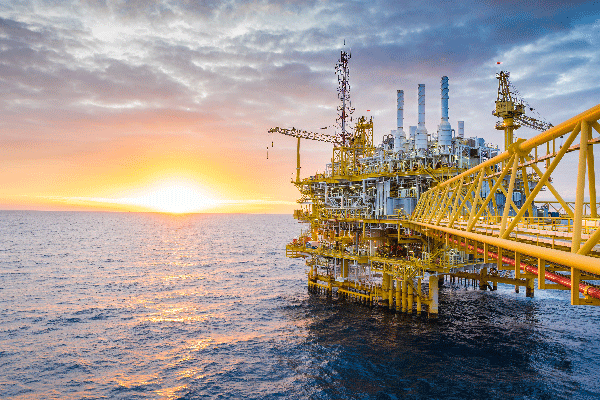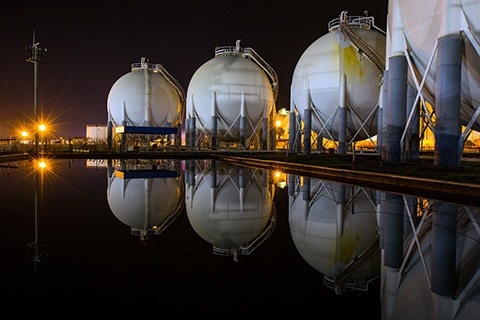Natural gas and oil are a key part of everyday life. Collectively, these fossil fuels represent 86% of the energy demand worldwide. Products produced from oil and gas are globally used as fuels like gasoline and diesel or as foundational elements for the petrochemical and chemical sectors.
The process of extracting, transporting, and refining oil and gas, however, is complex and hazardous to workers and assets. One of the most dangerous risks involved is that of fire or explosion due to flammable gases and liquids being present.
Toxic gases and chemicals that arise during the processes are associated with the risk of burns, asphyxiation, cancer, and system corrosion. Thus, oil and gas companies must follow mandatory safety practices to minimize the risks to life, property, and the environment.

Image Credit: Teledyne
Both portable and fixed gas detection systems, as well as flame detection systems, serve a crucial role in monitoring the environment for hazards. Workers also tend to be provided with respiratory or other safety gear to ensure their safety.
The good news is that the oil and gas industry, as a result of understanding and addressing hazards through mandatory regulations, now has fewer safety incidents today than in the past.
The oil and gas industry can be categorized into three major sectors:
Upstream
This sector involves drilling to search for underground or underwater crude oil and natural gas fields and operating the wells that recover and bring the crude oil and/or raw natural gas to the surface.
Upstream exploration and production may take place onshore or offshore. Currently, shale gas and oil exploration is a highly active part of this sector.
Midstream
This sector entails the transportation (rail, pipeline, barge, oil tanker, or truck) and storage of gas and oil from the well to the refinery or natural gas processing plant.
Downstream
Lastly, this sector involves refining crude oil and processing and purifying the raw natural gas that produces petroleum products, including diesel fuel, gasoline, heating oil, base for asphalt, kerosene, and liquefied petroleum gas (LPG).
The downstream market often involves petrochemical plants that use petroleum and gas products to generate Propylene, Ethylene, Butadiene, Benzene, and other byproducts utilized by many industries.
LPG Detection
Detecting leaks in LPG (Liquefied Petroleum Gas) is a prevalent issue across various segments of the oil and gas industry.

Image Credit: Teledyne Gas and Flame Detection
Regardless of your sector, addressing this concern is crucial to safeguard employees and shield facilities from LPG-related hazards. The following sectors are impacted by the risk of LPG leaks:
- Storage areas (bulk relay, gas storage for distribution)
- Filling stations (LPG bottling sites for domestic use)
- Gas stations (sale of LPG as fuel)
- The industrial sector, where the LPG is stored and employed as an energy source
There are several solutions that enable the risks associated with LPG to be prevented. A popular solution is the installation of gas and flame detectors to provide a warning in the event of abnormal gas concentrations or the start of a fire. These devices then trigger other safety devices.
Obligations for the implementing gas and flame detection solutions include:
- Order of 30/08/2010 heading 1414-3, for service stations
- Ministerial decree 4718 of 21/09/2017 for bulk relays, bottling sites, and customer facilities.
Available LPG Leak Detectors
Teledyne Gas and Flame Detection has several approved LPG leak detectors on offer to prevent the risks associated with the use or storage of explosive or flammable gases.
The company recommends the following from its portfolio:
- The OLC-OLCT100
- The IR detector GD10P
- The IR3 flame detector DFTV7
- The PS200 - portable gas leak detection equipment suitable for the marine sector
- The MX16 and MX43 detection controllers
- The GPLc kit, developed and suited to LPG dispensers in service stations
Purchasing and Renting LPG Leak Detectors
Teledyne Gas and Flame Detection has an international network of subsidiaries, representatives, and experienced distributors, which enables the company to provide its customers with LPG leak detectors for a required location or sector of work (e.g., refinery, extraction, distribution, storage).
For one-time needs or an emergency, Teledyne offers a rental service. The company also offers a variety of services to assist and optimize the utilization of gas detection systems, including commissioning, technical assistance, on-site maintenance, and repair.

This information has been sourced, reviewed and adapted from materials provided by Teledyne Gas and Flame Detection.
For more information on this source, please visit Teledyne Gas and Flame Detection.